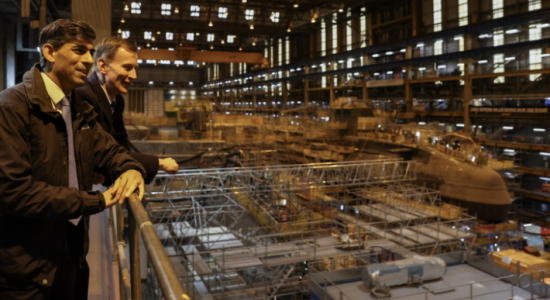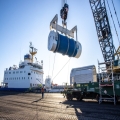UK Prime Minister Rishi Sunak has announced a package of public and private investment to reinforce the country's nuclear workforce and support 40,000 expected new jobs in its defence and civil nuclear industry.
The government said it is partnering with industry - including BAE Systems, Rolls-Royce, EDF and Babcock - to invest at least GBP763 million (USD965 million) by 2030 in skills, jobs and education. The investment will create more than 8000 career opportunities to help the sector fill 40,000 new jobs by the end of the decade – and will support plans to double the number of nuclear apprentices and graduates and quadruple the number of specialist science and nuclear fission PhDs.
"Domestic nuclear capability is vital to our national defence and energy security, underpinning our nuclear deterrent and securing cheaper, more reliable energy for UK consumers," the government said. "The nuclear industry is growing rapidly, requiring 50% more highly skilled workers in the next ten years – and we need to train a new generation of British talent."
Sunak also announced the creation of a Barrow Transformation Fund, with the government committing an immediate GBP20 million and a further minimum of GBP20 million annually over the next 10 years to make Barrow, in Cumbria, "an even more attractive place to live, work, and build a nuclear career".
Building on these new investments, Defence Secretary Grant Shapps has published the government's Defence Nuclear Enterprise Command Paper, setting out for the first time the full breadth of activity to sustain and modernise the UK's continuous at-sea nuclear deterrent.
"Safeguarding the future of our nuclear deterrent and nuclear energy industry is a critical national endeavour," Sunak said. "In a more dangerous and contested world, the UK's continuous at-sea nuclear deterrent is more vital than ever. And nuclear delivers cheaper, cleaner home-grown energy for consumers.
"That's why we are investing in Barrow, the home of UK submarines, and in the jobs and skills of the future in the thriving British nuclear industry. Today we usher in the next generation of our nuclear enterprise, which will keep us safe, keep our energy secure, and keep our bills down for good."
David Lockwood, CEO Babcock International and member of the Nuclear Skills Executive Council added: "This is a fantastic opportunity for the UK to deliver a stronger nuclear industry that will contribute to the resilience of the UK's independent deterrent and will support the UK's energy security ambitions and net-zero targets."
"EDF welcomes the joint commitments announced today and looks forward to working with government and industry to help deliver the great opportunities for people who choose to work in the nuclear sector," said Simone Rossi, CEO of EDF in the UK and member of the Nuclear Skills Executive Council. "EDF has been at the heart of the UK's nuclear energy sector for over 15 years and in 2024 is hiring a further 1000 people into its UK nuclear family - in operations, construction, engineering support and many other exciting roles. The majority of these will be apprentices and graduates, as well as those with relevant skills from other industries.
"As we have learned in recent years there is an urgent need to attract, train and inspire the next generation of people who can design, build, operate and decommission existing and new nuclear facilities. We are excited to be part of this national endeavour."
The UK's energy strategy unveiled in April last year set the target for eight new reactors plus small modular reactors to produce 24 GWe capacity by 2050, meeting about 25% of the UK's projected electricity demand. The UK currently generates about 15% of its electricity from about 6.5 GW of nuclear capacity. The first new nuclear capacity in the UK for about 30 years is being built by EDF at Hinkley Point C - two EPRs producing 3.2 GW of electricity - with a final investment decision expected soon on a similar sized project at Sizewell C. The UK's nuclear industry is expected to need 123,000 people by 2030.
The government said the investment in nuclear skills - which includes GBP350 million from the government and more than GBP400 million from industry - will create some 5000 new apprenticeships in the next four years. It will also drive private investment and create job opportunities for everyone from specialist scientists and engineers, to welders and electricians, to project managers and Royal Navy submariners.
Welcoming the new funding to boost nuclear skills and jobs, Tom Greatrex, Chief Executive of the Nuclear Industry Association, said: "This is a very welcome investment which will help ensure we have enough people with the right skills to ramp up nuclear capacity to the levels needed for energy security. It is a great opportunity for the government and industry to work together to attract workers into an exciting and cutting-edge sector that will play a vital role in the UK's journey to net-zero.
"Meeting the UK's ambitious nuclear targets will require a huge ramp up in all parts of the workforce from engineering to construction so it is important we attract and train the next generation of nuclear workers so that we keep pace with other countries that are doing the same. The industry, which is match-funding the government's investment, stands ready to do all it can to support in that endeavour."
Photo credit:
Prime Minister Rishi Sunak (left) and Chancellor of the Exchequer Jeremy Hunt (right) visit BAE Systems in Barrow-in-Furness, where UK submarines are manufactured (Image: Simon Dawson / No.10 Downing Street)
- 101 views








